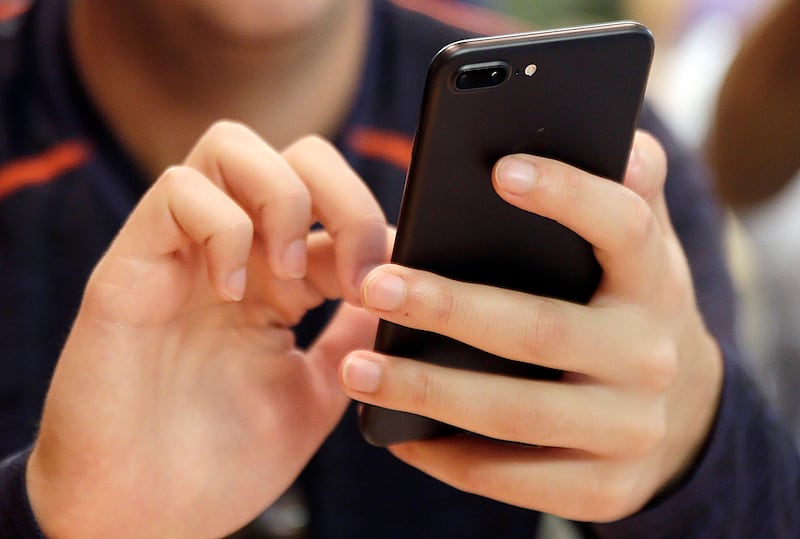If you’re one of those people who, while working online or scrolling on your phone, interrupts yourself a lot to check an email or open a new tab or take a quick look at that cat video someone sent, you’re not alone.
Rather — like most folks these days — your attention span’s the issue. Your ability to focus while using a screen is pretty much shot and you might need to take some corrective action if you don’t want to be the guy or gal who flitters and fritters and never gets anything done.
Gloria Mark, Chancellor’s professor in the Department of Infomatics at University of California, Irvine, wrote a book about the disappearing attention span. Her just-released “Attention Span: A Groundbreaking Way to Restore Balance, Happiness and Productivity” says that nearly 20 years ago, people averaged 2.5 minutes of focused attention when they were working online or doing something involving screens, before switching to a different screen. By 2012, that time span had shrunk to 75 seconds. And by 2021, it had compacted to a measly 47 seconds.
In a Wall Street Journal article, she said it wasn’t a guesstimate: “We used sophisticated computer logging techniques to measure attention spans and heart rate monitors and wearable devices to measure stress.”
Email’s a big distraction and her research shows people check theirs about 77 times a day.
After each interruption — and most are self-imposed — Mark told CNN it takes about 25 minutes to get back on track.
“If we look at work in terms of switching projects, as opposed to the micro view of switching screens, we find people spend about 10½ minutes in any work project before being interrupted — internally or by someone else — and then switch to another work project,” Mark said.
But the cost isn’t limited to productivity. Rather, studies show the interruptions and lack of focus also raise anxiety and stress, while lowering productivity. She said the brain pays while trying to switch attention back and forth, leading to errors and missed deadlines.
It’s an international phenomenon. Because folks don’t — can’t? — pay attention long, the India business publication Mint reports that “there is a constant desire for fresh, engaging content and people are paying more attention to shorter content formats for bite-sized” entertainment and information.
Not just distracting
Attention switching is stressful. CNN said that blood pressure rises, the heart rate quickens and sometimes people feel more fatigued, in addition to making mistakes and accomplishing less.
Young people know it’s a problem. As a headline on a student column in the American River College Current said, “TikTok is shrinking our attention span with every swipe.” The article said the short videos “make it very easy for people to lose interest in longer activities” and that “those who use the app for over 90 minutes can narrow their collective attention span over time.”
In 2019, The Guardian reported that “the information age has changed the general attention span. A recently published study from researchers at the Technical University of Denmark suggests the collective global attention span is narrowing due to the amount of information that is presented to the public.” It said the findings, published in Nature Communications, indicate “people now have more things to focus on — but often focus on things for short periods of time.”
Per the article, Professor Sune Lehmann, who was involved in the study, said in a press release from the Technical University of Denmark, “It seems that the allocated attention time in our collective minds has a certain size but the cultural items competing for that attention have become more densely packed.”
Clawing back control
Mark told CNN that nature breaks — say a 20-minute walk — can help folks relax and get more done. “We found it can help people produce significantly more ideas — it’s called divergent thinking,” she said.
Another way to regain control of this real problem is to pay attention to how you use technology. It can, after all, be boon or bane.
You can also do something that requires no brain power. “I have a friend who is an MIT professor and his favorite activity is matching socks,” Mark told CNN. “Another friend likes to iron. Ideas can incubate and then we come back to the hard work and we see it with fresh eyes.”
She suggested scheduling the boring stuff you have to do for early in the day. Later, block distractions to accomplish more when you’re feeling sharp. And at night, write down the things you have yet to do, “then put the list away,” CNN said.
Several countries, including Ireland and France, have instituted “right to disconnect” policies that say workers don’t have to answer work-related emails when they aren’t on the clock, Mark wrote in The Wall Street Journal.
A blog for The School of Business at The George Washington University offers tips for building attention span. Among items on the list:
- Practice meditation. If you don’t know how, look online, where there’s a ton of information. Although, ironically, you may find that challenges your attention span.
- Practice attentive listening.
- Read more — and pay attention. It said to develop a reading routine and carve out time for reading without distractions.
- Get moderate levels of exercise by jogging, riding a bike or taking a brisk walk.
- Reduce distractions.
- Focus on doing one thing at a time.


